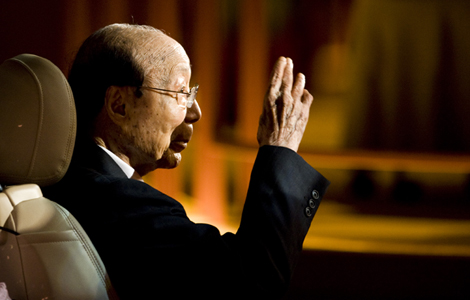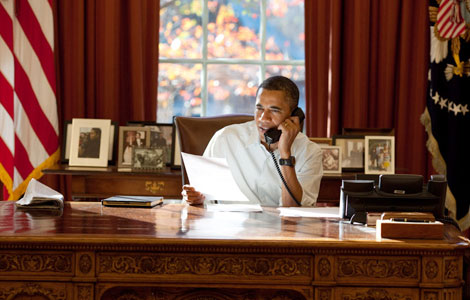Chance for peace in South Sudan
Updated: 2014-01-09 07:42
By He Wenping (China Daily)
|
|||||||||||
As peace talks between South Sudan's government and rebels started in Ethiopia on Monday, China has urged South Sudan's warring sides to seek a reasonable and rational solution to their conflict and to restore the rule of law and order.
China is gravely concerned about the recent clashes in South Sudan, and hopes that both sides, in accordance with the comprehensive and long-term interest of the South Sudanese people, can agree to end the violence, said Chinese Foreign Minister Wang Yi after meeting separately with representatives of South Sudan's warring sides in the Ethiopian capital of Addis Ababa.
China is the largest investor in South Sudan, where it has great petroleum interests. South Sudan is estimated to have sub-Saharan Africa's third-biggest oil reserves, up to 3.5 billion barrels, and its highest daily output has been 250,000 barrels. In 2012 China imported 70 percent of South Sudan's crude oil, and Chinese petroleum enterprises have a 40 percent share in South Sudan's petroleum pipeline. Like the situation during Libya's civil war two years ago, Chinese people's personal and property safety in South Sudan have been threatened, and more than 300 Chinese people have been evacuated from South Sudan to neighboring countries. Because of this, some foreign media have claimed that China is the biggest victim of the conflict and now in a predicament.
However, it should be pointed out that, first and foremost, it is the South Sudanese people and the young country's development process that are suffering the most from the conflict. More than three weeks of chaos caused by the war have disrupted national reconstruction and caused a huge humanitarian disaster.
The peace talks are the first face-to-face negotiations between the South Sudan government forces led by President Salva Kiir and rebel forces loyal to former vice-president Riek Machar. The conflict was initially a power struggle between two factions within the ruling party, but it soon escalated into ethnic group killing because ethnic identity outweighs national identity in South Sudan. The ethnic violence between the majority Dinka group, which Kiir is from, and the second largest group, the Nuer, which Machar is from, is destroying the foundations of national identity and the war is bringing the country to the brink of being a failed state.
The war also threatens regional peace and stability. Compared with other parts of Africa, the Horn of Africa and North Africa have suffered a lot from the terrorist activities of extremist organizations and rebel forces. In recent years, the activities of Somalia's al-Shabab terrorist group have crossed the border of Somalia into Uganda and Kenya. Uganda and the Democratic Republic of the Congo have suffered for years from rebel forces such as the Lord's Resistance Army and the M23 rebel group. The Central African Republic has fallen into civil strife since the second half of 2013.
Related Stories
More than 200,000 people displaced in South Sudan: UN 2014-01-09 05:09
China calls for 'rational' fix in S. Sudan 2014-01-08 08:16
S. Sudan rebels, govt begin talks on ceasefire 2014-01-07 17:08
Talks delayed as gunfire in S Sudan capital 2014-01-06 04:19
Today's Top News
New ambassador to the EU takes up reins
Top court seeks judicial transparency
China has most outbound tourists
Turkey removes police chiefs amid graft probe
Four feared dead in British helicopter crash
Tokyo urged to end militarism
Russia imposes security clampdown in Sochi
Chinese developer inks London deal
Hot Topics
Lunar probe , China growth forecasts, Emission rules get tougher, China seen through 'colored lens', International board,
Editor's Picks

|

|

|

|

|

|





